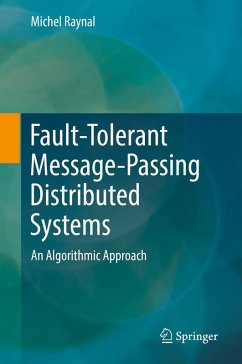
Fault-tolerant Agreement in Synchronous Message-passing Systems (eBook, PDF)
Sofort per Download lieferbar
Statt: 37,44 €**
28,95 €
inkl. MwSt.
**Preis der gedruckten Ausgabe (Broschiertes Buch)
Weitere Ausgaben:

PAYBACK Punkte
14 °P sammeln!
Understanding distributed computing is not an easy task. This is due to the many facets of uncertainty one has to cope with and master in order to produce correct distributed software. A previous book Communication and Agreement Abstraction for Fault-tolerant Asynchronous Distributed Systems (published by Morgan & Claypool, 2010) was devoted to the problems created by crash failures in asynchronous message-passing systems. The present book focuses on the way to cope with the uncertainty created by process failures (crash, omission failures and Byzantine behavior) in synchronous message-passing...
Understanding distributed computing is not an easy task. This is due to the many facets of uncertainty one has to cope with and master in order to produce correct distributed software. A previous book Communication and Agreement Abstraction for Fault-tolerant Asynchronous Distributed Systems (published by Morgan & Claypool, 2010) was devoted to the problems created by crash failures in asynchronous message-passing systems. The present book focuses on the way to cope with the uncertainty created by process failures (crash, omission failures and Byzantine behavior) in synchronous message-passing systems (i.e., systems whose progress is governed by the passage of time). To that end, the book considers fundamental problems that distributed synchronous processes have to solve. These fundamental problems concern agreement among processes (if processes are unable to agree in one way or another in presence of failures, no non-trivial problem can be solved). They are consensus, interactiveconsistency, k-set agreement and non-blocking atomic commit. Being able to solve these basic problems efficiently with provable guarantees allows applications designers to give a precise meaning to the words ""cooperate"" and ""agree"" despite failures, and write distributed synchronous programs with properties that can be stated and proved. Hence, the aim of the book is to present a comprehensive view of agreement problems, algorithms that solve them and associated computability bounds in synchronous message-passing distributed systems. Table of Contents: List of Figures / Synchronous Model, Failure Models, and Agreement Problems / Consensus and Interactive Consistency in the Crash Failure Model / Expedite Decision in the Crash Failure Model / Simultaneous Consensus Despite Crash Failures / From Consensus to k-Set Agreement / Non-Blocking Atomic Commit in Presence of Crash Failures / k-Set Agreement Despite Omission Failures / Consensus Despite Byzantine Failures / Byzantine Consensusin Enriched Models
Dieser Download kann aus rechtlichen Gründen nur mit Rechnungsadresse in A, B, BG, CY, CZ, D, DK, EW, E, FIN, F, GR, HR, H, IRL, I, LT, L, LR, M, NL, PL, P, R, S, SLO, SK ausgeliefert werden.












